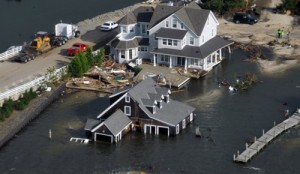
Hurricane Sandy Insurance Tips
To visit D’Arcy Johnson Day’s Hurricane Sandy Claims Center, please click here.
Below is a summary of the Hurricane Sandy Insurance Tips attorney Andrew D’Arcy discussed this morning on the Lite Rock Morning Show on 96.9 with Eddie Davis:
First Steps
First and foremost, if you are insured (homeowners, flood, etc.), you should make a claim with your insurance company BEFORE contacting FEMA. If you do not have flood insurance, do not underestimate what your homeowners policy may cover. Many policies cover damage from wind and you may be able to make a claim. Once you have made a claim, you should also make an application to FEMA, either online, or by phone (have your insurance company name, date of claim, and claim number readily available) to possibly supplement anything NOT covered by insurance. FEMA accepts applications online and over the phone:
Below is a summary of the Hurricane Sandy Insurance Tips attorney Andrew D’Arcy discussed this morning on the Lite Rock Morning Show on 96.9 with Eddie Davis:
First Steps
First and foremost, if you are insured (homeowners, flood, etc.), you should make a claim with your insurance company BEFORE contacting FEMA. If you do not have flood insurance, do not underestimate what your homeowners policy may cover. Many policies cover damage from wind and you may be able to make a claim. Once you have made a claim, you should also make an application to FEMA, either online, or by phone (have your insurance company name, date of claim, and claim number readily available) to possibly supplement anything NOT covered by insurance. FEMA accepts applications online and over the phone:
If you are unsure who your insurance company is, you should call the Department of Banking & Insurance at 1.800.446.7467 or visit their website at www.dobi.nj.gov to obtain that information. All current insurance policies in New Jersey are recorded with the DOBI.
Tips for Making a Claim
Tips for Making a Claim
- Make a written inventory of damage.
- Make a written inventory of damaged personal property/contents, even if the item has been lost and cannot be accounted for.
- Take photos of damage/damaged contents and personal property.
- Keep ALL receipts for anything replaced, repaired, and additional living damages (hotel stays, etc.)
- Make a note of anyone you speak to at the insurance company, the date you called, any information they gave you, any claim #’s assigned, etc. It is very important that you keep track of this information and stay on top of the status of your claim.
- The official site of the National Flood Insurance Program is www.floodsmart.gov. This site is user friendly and informative and contains a unique “plug-in-facts” feature that is designed to estimate the cost of an individual’s flooding reparation.
- If you are uninsured, you may make application to FEMA, either online, or by phone.
- If your homeowners claim/flood insurance claim is turned down AND you are unsuccessful with an appeal of such a decision, you may want to consider seeking legal representation for a potential bad faith claim against your insurance company. There is no guarantee of successful litigation, but insurance companies may simply reject claims without cause when a deluge of claims arise immediately following a disaster such as Hurricane Sandy. Contact D’Arcy Johnson Day for a free consultation.
- When, and if, the time comes that your claim is paid out and you are ready to begin making repairs, be wary of any contractors contacting you, and even contractors you contact to perform restoration or repair work to your home or grounds surrounding your home. Be sure to confirm that they are licensed and insured. Ask to see their license and certificate of insurance. You may even want to check references. You can call the BBB (Better Business Bureau) to check on their status. New Jersey residents can go online to http://newjersey.bbb.org, or call 609.588.0808. Though this may take time and slow the repair process, you will face a much longer and harder road if you allow a scam artist or “storm chaser” contractor to take your insurance money and either perform substandard work or NO work at all.